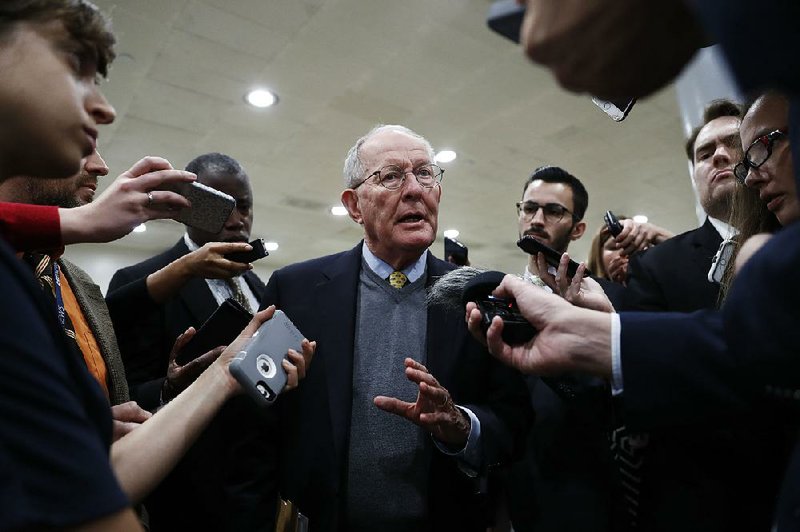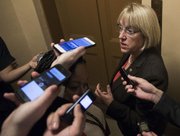WASHINGTON -- President Donald Trump on Wednesday qualified his endorsement of a bipartisan Senate proposal to stabilize health insurance markets, even as the chief architect of the deal predicted that it would become law before the end of the year.
Trump on Tuesday appeared to give his blessing to a deal to restore health insurance subsidies that he had canceled days before the accord was announced. Sens. Lamar Alexander, R-Tenn., and Patty Murray, D-Wash., agreed on legislation that would continue federal payments to insurance companies through 2019 to reimburse them for discounts they are required to provide to millions of low-income people who have coverage under the Patient Protection and Affordable Care Act.
But Wednesday, the president appeared to send a different message.
"If something can happen, that's fine," Trump told reporters at the White House. "But I won't do anything to enrich the insurance companies because right now the insurance companies are being enriched. They've been enriched by Obamacare like nothing anybody has ever seen before."
[PRESIDENT TRUMP: Timeline, appointments, executive orders + guide to actions in first 200 days]
Earlier in the day, Trump wrote on Twitter, "I am supportive of Lamar as a person & also of the process, but I can never support bailing out ins co's who have made a fortune w/ O'Care."
Alexander, the chairman of the Senate health committee, suggested that message may have been more of a caveat than a rejection. He said he received a telephone call Wednesday from the president.
"He wanted to be encouraging about the bipartisan agreement that Sen. Murray and I announced yesterday," Alexander said.
Trump "intends to review it carefully to see if he wants to add anything to it," Alexander said, adding that the president "wants to reserve his options."
In fact, Alexander and Murray already have moved to address concerns that restoring the payments to insurers could be viewed as providing them with a "bailout." On Tuesday, Alexander said their deal would contain "the strongest possible language" to ensure that the money provided for the subsidies would go to the benefit of consumers, not insurers.
And on Wednesday, he took to Twitter to say he and Trump are in agreement on the cost-sharing reductions.
"He and I absolutely agree that [the cost-sharing payments] should benefit consumers and not insurance companies," Alexander said on Twitter, adding, "The Alexander-Murray agreement has strong language to do that, and I will work with the president to see if we can make it even stronger."
The bill's authors may be counting on amassing support for the plan for when they have more leverage to pass it, later in the year. In December, the government will run out of money, and no bill to keep it funded can pass without Democratic votes.
At that point, supporters of the Alexander-Murray measure can insist on its inclusion in any spending bill and threaten to shut down the government if they do not prevail.
Some Republicans have said they back the agreement, including Sens. John McCain of Arizona, Susan Collins of Maine and Lisa Murkowski of Alaska.
Sen. Bill Cassidy, a Louisiana Republican and the co-author with Sen. Lindsey Graham of the most recent legislation to repeal the Affordable Care Act, offered his qualified support.
"If combined with greater flexibility to allow states to lower costs, this will set the stage for replace through a mechanism such as Graham-Cassidy. I will study this proposal to see if it accomplishes these goals."
On Wednesday night, a bipartisan group of 10 governors urged congressional leaders to support the Alexander-Murray plan, saying in a letter that Congress should extend the cost-sharing payments at least through 2019.
"Stabilizing insurance markets is one of the primary areas where Congress can take action to ensure that consumers have affordable health care options," the governors write.
The governors of Ohio, Colorado, Montana, Alaska, Pennsylvania, Nevada, Virginia, Louisiana, Massachusetts and Vermont signed the letter.
But in a blow to the deal, House Speaker Paul Ryan, R-Wis., came out against it.
"The speaker does not see anything that changes his view that the Senate should keep its focus on repeal and replace of Obamacare," Doug Andres, a spokesman for Ryan, said Wednesday.
Other Republicans said the plan likely needs Trump's backing to survive.
"Without the president supporting it, I don't think you have the votes in the House or the Senate," No. 3 Senate GOP leader John Thune of South Dakota told reporters, adding, "We're stalled out."
Alexander, speaking Wednesday at a forum convened by Axios, a news website, insisted that he and Trump were on the same page.
"The president engineered the bipartisan agreement by calling me and asking me to work with Sen. Murray to do it. I've talked with him three times in the last 10 days about it," he said.
Alexander predicted that the plan would "pass in some form before the end of the year." And he said the deal included several victories for conservatives, making it easier for states to revamp their insurance markets and allowing people of any age to buy low-cost, high-deductible health plans providing catastrophic coverage.
A federal judge ruled in 2016 that the federal payments to insurance companies, known as cost-sharing reductions, violated the Constitution because Congress never provided money for them. Citing that ruling, Trump announced last week that he would stop the payments.
Trump says he still supports longer-range efforts to repeal the Affordable Care Act and replace it with block grants to states.
Such big changes would not take effect until 2020 or 2021, Alexander said.
"What do you do in the meantime?" he asked. "What you don't want to do in the meantime is create chaos and hurt millions of Americans."
"What does chaos do?" Alexander asked. "It's a four-lane highway to a single-payer solution. It's a birthday present for Bernie Sanders" -- the independent Vermont senator and leading advocate for a single-payer "Medicare for all" health care system.
In a brief interview Wednesday afternoon, Murray brushed aside the president's comments about the bipartisan plan.
"This is not about the president. This is about just doing the right thing so the American people's rates don't go up, and that's where we're focused," she said.
Asked whether she was willing to alter the terms of the agreement, Murray replied, "No. We have a deal; we're moving it forward."
Some Democrats said they have no reservations about trying to solve a problem that, in their view, was created by Trump and for which his party will be blamed if Congress takes no action.
"We know doing this will be good for the country," said Sen. Sherrod Brown, D-Ohio. "I hope that people here aren't that cynical, that, 'Why would you do it just because it's good for the country?'"
The Senate Democratic leader, Charles Schumer of New York, pushed back on the president's Wednesday Twitter post, expressing exasperation in remarks on the Senate floor.
"Frankly, the president doesn't know what he's talking about in the compromise," Schumer said. "It doesn't bail out insurance companies. It helps people who are sick and who need health care."
Schumer said the president "keeps zigging and zagging, so it's impossible to govern."
"Our only hope is maybe tomorrow he'll be for this again," he added.
Information for this article was contributed by Robert Pear and Thomas Kaplan of The New York Times and by Alan Fram of The Associated Press; and by Sean Sullivan, Juliet Eilperin, John Wagner, Jordan Frasier and Paul Kane of The Washington Post.
A Section on 10/19/2017

